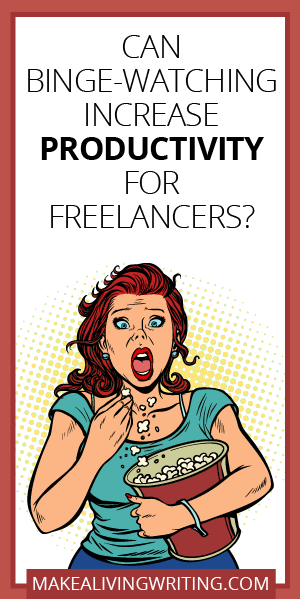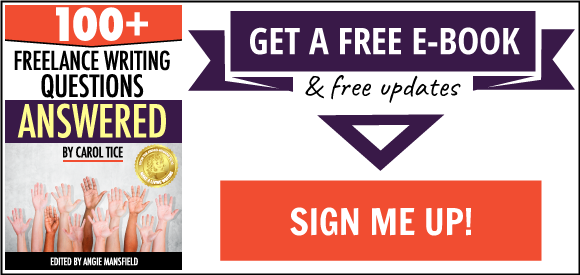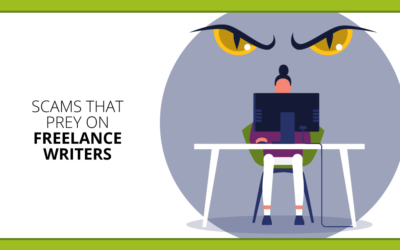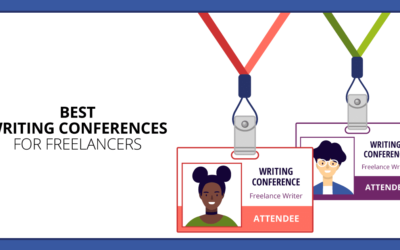
It’s up to you to stay motivated and disciplined, even on days when you’d rather scoop the litter box than finish that blog post, write a query, or find new clients to pitch.
How do you keep the words flowing in spite of online and off-line distractions, family responsibilities, and bad days?
Most people aren’t born with a sixth-sense for productivity. In fact, a lot of people, including writers, are notorious for stalling, wasting time, and procrastinating for an infinite list of reasons (ahem, excuses).
That ends now. You can learn productivity habits to help you maximize your time, get work done, and even carve out a little time for binge-watching your favorite show. Here’s how:
Meet two productivity pros & freelance writers
We recently interviewed two writers and productivity experts in the Freelance Writers Den who know all about the headaches, challenges, and excuse-making of pursuing the freelance life.
- Sage Cohen is the author of Fierce on the Page, The Productive Writer, and Writing the Life Poetic (all from Writers’ Digest Books). She is also a poet, copywriter, and coach.
- Laura Stack is a productivity expert and speaker. She is the author of several books, most recently Faster Together: Accelerating Your Team’s Productivity.
Want to make your freelance writing time more productive? Find out how in this Q&A:
Q: What’s the best way to start your day off productively?
A: Cohen: It’s different for everybody. I start by hiking with my dog in the morning, then I spend the first ten minutes at my desk checking personal e-mail to connect with other grownups.
Whatever gets you cranking is the way to go, and you’re not going to know until you experiment. If you’re starting your day with something that gets you off track, try something else.
Q: How do you stay focused when you don’t have a boss breathing down your neck?
A: Stack: I make my own deadlines. My books come out every two years like clockwork, and that doesn’t just happen. There’s a lot of discipline, structure, and deadline-driven work that I’ve created for myself.
Q: How can writers ignite their productivity on days when they’re sick, tired, or dragging?
A: Cohen: First, shake things up. Do the opposite of what you normally do. If you work at home, go to a café. If you walk the dog at the end of the day, try walking the dog at the beginning of the day. Spice things up and surprise yourself.
Second, have an accountability buddy. Tell them you’re committing to have something done, so you have that extra energy boost of knowing that someone is in your corner with you.
Q: How do you schedule your time to be the most productive?
A: Stack: Writers have to understand and organize around their rhythms. Everyone is different. It’s counterproductive to write at a time where you’re low energy.
Block off your calendar. Be proactive around your goals for content creation during high-energy times.
Q: What are your strategies for handling people who don’t respect your work space and time?
A: Cohen: People who are not writers themselves don’t get what we need in the way of silence, space, and boundaries and respect. Our job is to teach them.
We need to be extremely clear about what we need and set ground rules: “I don’t want crumbs on my desk. Look at the sign on my door to see what the office hours are.”
When your family members do whatever you’ve asked them for, thank them. Make it clear how much you appreciate their support.
Q: When should you outsource tasks, and how do you justify the expense?
A: Stack: Do the things only you, uniquely, can do. Outsource things others could do. We fail often as writers because our time is taken up by everything but our writing, doing all the administrative tasks.
I used to struggle with the cost of outsourcing. But every time I did it, my revenue went up. I kick myself now for all of the wasted time and frustration, and low income, that resulted from not outsourcing. You can’t afford not to do it.
Q: What are the top things that kill productivity for writers?
A: Cohen: Listening to the wrong advice. Just because you love someone’s writing, it doesn’t mean what they’re suggesting is well suited to you. Experiment, pay attention to your results, and if you’re not achieving what you hoped, try something else. Don’t assume the problem is you.
In the writing life you are your own boss, you are your own collaborator, you are your own everything. Get to know yourself, and set things up so you can be effective based on what is realistic for you.
Two sneaky faces of fear are procrastination and perfectionism. Just having the awareness that we’re afraid can make a huge difference. Then we need to decide the fear is not in not in charge.
When I wrote my first book, I knew I would spend time telling myself I couldn’t do it and spinning. So I built a month of freak-out time into my schedule. During my normal writing time I watched all the seasons of Six Feet Under. By the end, I was so sick of it that I just got down to work, and I had an incredibly productive six months of writing.
Q: Do you have a writing process that makes you more productive?
A: Stack: I do mind mapping on a big whiteboard. You can do electronically, but I work better on a wall or just a piece of paper.
Write your main topic in the center of your page, then write other thoughts that occur to you. It’s just really a series of bubbles where you allow your brain to go anywhere. Then you can turn it into a written outline.
If you google “mind mapping,” you can find entire process and examples online.
Q: What motivates you to keep your butt in the chair and just get it done?
A: Cohen: We need to stay connected to our big-picture goals, our purpose and passion. What is the end goal? “I need to finish this article, because I’m going to get paid.” Or, “I am improving my craft.” Or, “I am becoming an expert on this topic that is important to me.”
When we can remember why we’re there and sit down with that mindset, it is much, much easier to keep the butt in the chair.
The power of productivity
If you’ve struggled with productivity issues to get work done, you’re not alone. It happens. But take a closer look at your habits, your schedule, and when you do your best work, and you can map out a plan to move up and earn more.
What helps you boost productivity as a freelance writer? Join the discussion on Facebook and LinkedIn.
Maria Veres is a freelance writer based in the Oklahoma City area. She contributes regular Q&A blog posts to Make A Living Writing.










